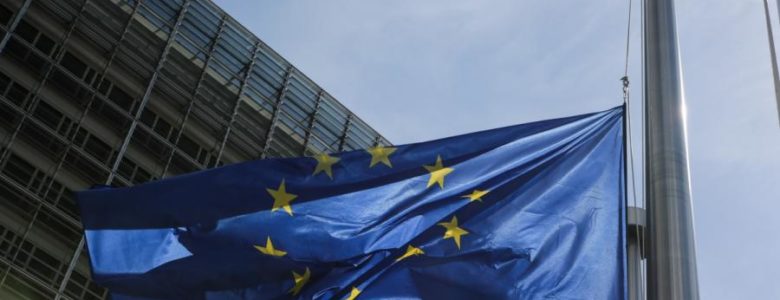
Europe Day: not a day of celebration (yet)
What does it mean to love Europe, and what does that love, in 2018, demand of us?
The European project was borne out of an initiative well worth a dedicated day of celebration: the end of war in Europe. The project conceived for this task, albeit ingenious, harboured within it the poison that would cause it to whither: economic integration, without political unification. By basing the entire project for unifying Europe on trade, the path towards the neoliberal and politically inept European Union that we have inherited today was written in the stars from the moment of its beautiful inception.
So on this “Europe Day” let’s reflect on what kind of a Europe we have, why we have it, and how to move towards a new one that can make us proud to be a part of. A political structure controlled by the interests of capital and deadlocked by political games between member states makes a mockery of the European dream of a united continent of solidarity between its peoples. It is a structure that stands in the way of creating the kind of EU that can deal with the challenges we face: environmental and financial crises, the rise of xenophobia, authoritarianism and geopolitical unrest. That resilient EU can only be based on democracy, where Europe’s citizens can hold Europe directly accountable for its actions, and directly elect those who control its direction.
A democratic EU: now that warrants a celebration on Europe Day! Until then, every Europe Day spent under an EU that betrays the democratic principles of its citizens, and acts as the architect of its own disintegration, is a cause for demonstration. That is what our love of Europe demands of us: opposition and a creative re-invention of a doomed EU.
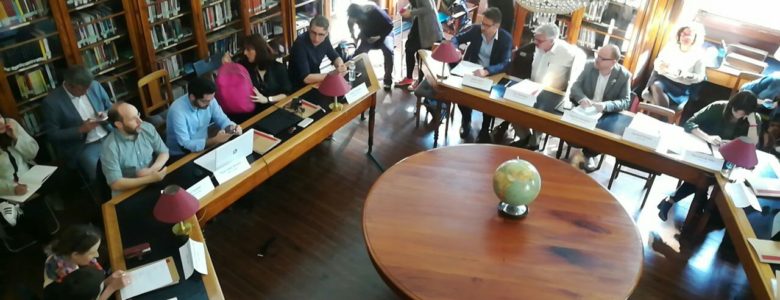
DiEM25's invitation to Pablo Iglesias (Podemos), Catarina Martins (Bloco), Jean-Luc Mélenchon (FI) and Gregor Gysi (European Left) to an open discussion with EUROPEAN SPRING
To: Pablo Iglesias (Podemos), Catarina Martins (Bloco) and Jean-Luc Mélenchon (FI)
7 May 2018
Dear Pablo, Catarina and Jean Luc,
Thank you for your reply of 25th April. It is a pity that you could not make it to Lisbon on 26th April, but we understand that the notice was perhaps too short.
In our Lisbon meeting, that was open to the public, we discussed a large number of issues, including the policy agenda we shall be taking to European voters as well as the name of our transnational movement – which we decided will be: European Spring
More precisely, we committed ourselves to two main objectives:
- Achieving Left Unity
- Adopting a Common and Coherent Policy Agenda (or Manifesto) that makes sense to European progressives across the Continent
In that context, we resolved that European Spring, our movement, will do its utmost to work together with you and with other progressive movements on the run up to the European Parliament elections of May 2019.
As our common goal is, indeed, a paneuropean political revolution (led by citizens for citizens and against the Deep Establishment that condemns the many to permanent austerity), but also in view of your declaration in your recent reply that you are, indeed, interested in a dialogue between our organisations, now is the time to organise a meeting.
So, we propose that the five of us meet to discuss what we can each contribute to a coherent, credible united left-wing alternative to Establishment’s authoritarian incompetence – with an invitation also extended to Gregor Gysi as the representative of the European Left Party. Moreover, we believe that the discussions between us, including the current exchange, should be part of the public discourse – acknowledging that secret diplomacy is inherently reactionary.
If you agree, we are open to meet you on a mutually agreed date anywhere in Europe. On behalf of EUROPEAN SPRING,
Yanis Varoufakis
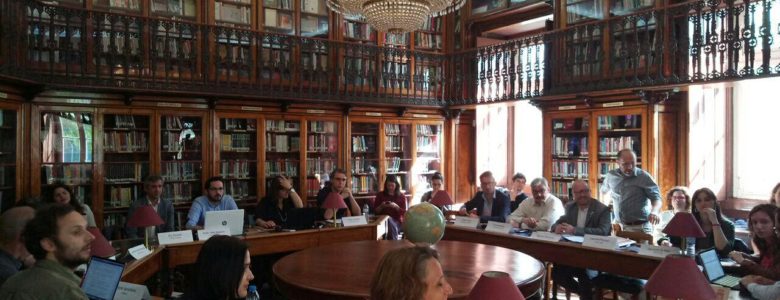
European Spring: 2nd Council Meeting Conclusions
Here are the complete set of agreements reached during European Spring’s Provisional Governing Council’s meeting last month in Lisbon:
Lisbon, April 26, 2018
2st meeting of the Provisional Council
Participants:
DiEM25 (EU); DemA (Italy); Génération.s (France); LIVRE (Portugal); Razem (Poland); Alternativet (Denmark); MeRA25 (Greece); Bündnis DiEM25 (Germany)
Observers:
Actúa, Barcelona en Comú, Die Linke, Nouvelle Donne, Parti communiste français (PCF), Party of the European Greens, Party of the European Left, and Transform!
Co-chairs:
Agnieszka Dziemianowicz-Bąk and Lorenzo Marsili
***
AGREED CONCLUSIONS
-
1. Discussion on relations with other movements, parties, and 2019 lists
The Council assessed the situation regarding emerging political offers in the progressive field towards the 2019 European elections. We recalled that for several months we have been issuing invitations to all our meetings – which are always public and open – as well as to private meetings in order to build bridges and cooperation. We aspire to two things: unity and coherence.
The Council took stock of the positive response received from Gregor Gysi on behalf of the European Left to our proposal of organising a joint meeting to look at cooperating ahead of the 2019 elections. We also took notice of the negative response received from Bloco de Esquerda to attend the Lisbon meeting, which was partly corrected by the response received jointly by Mélenchon-Iglesias-Martins to an earlier personal letter issued by Yanis Varoufakis and Luigi de Magistris to them. We agreed to issue another letter to both Gregor Gysi and Martins-Mélenchon-Iglesias to suggest again a joint meeting and to do so publicly (no secret diplomacy). Should such a meeting be organised, the Council will decide on appointing its representatives.
-
2. Voting on a name for our Transnational List
We voted on a name for our Transnational List. Several names were proposed:
- European Spring
- Demos
- DiEM25
- Hope is Back
- Together for Europe
- Republic of Europe
The Council unanimously voted for “European Spring”, which now becomes the official names of our transnational list. An agreed logo will be defined ASAP, with both Alternativet and DiEM25 working on first proposals. We ask all the partners to secure the domains with this name translated into their languages.
-
3. Registering the Transnational List
Review of current conditions which political parties and associated foundations must fulfil to be eligible for public funding:
- respect of EU values (Article 2 TEU)
- only political parties (and no longer individuals) will be taken into account towards the minimum representation requirements for European political party funding
- member parties must be represented in ¼ of Member States (i.e. 7) in either the EP, national parliaments, regional parliaments or regional assemblies
- member parties cannot be members of another European political party
- EU member parties need to have displayed the logo and programme of the European political party in the 12 months preceding the final date for submission of funding applications
- derogation: application for funding in the financial year of 2019, the Authorising Officer only requests this evidence for the period from two months after the entry into force of the Amending Regulation (date of publication in the Official Journal of the EU: TBC)
Distribution key of funds: 10% of funds to be shared equally between European political parties, and 90% of funds to be distributed based on vote percentage, post-election
Note: the fielding of a Spitzenkandidat is not legally tied to being a registered European party, but it would enhance our campaign actions.
-
4. Code of Ethics
We discussed and amended the code of ethics binding European Spring and all our candidates. The code was unanimously approved.
-
5. Communication, June launch & the general debate about campaign
We agreed that we would create a joint Campaign Subgroup that will coordinate the June pan-European launch campaign.
The events that will mark the beginning of the 2019 May Elections Campaign are as follows:
3 June – Frankfurt / Germany
13 June – Milano / Italy
16 June – Denmark
23 June – Warsaw / Poland
1 July – Grenoble / France
Possible addition of Brussels and/or Berlin. Deadline to confirm participants, information about venues and program for each event is May 15.
We agreed to develop a common website by next May and share the cost. DiEM25 will present a first option ASAP.
We discussed the importance of the whole communication and electoral campaign throughout 2019, favouring the “citizens assemblies” format to engage a wider public in a common debate about political priorities for a transformed Europe. Eleonora de Majo (DemA) and Paola Pietrandrea (DiEM25 – France) will table a concrete proposal by the next Council meeting.
-
6. Organogram
We produced an organogram of the different subgroups working with the Council and the individuals composing them. All partners are asked to double-check and complete the proposed draft.
-
7. Discussion on the preamble for our common Manifesto
We agreed to draft the preamble following the “beta version” of our common political program.
-
8. Key points of our common Manifesto
We discussed the early draft of our common political platform. We assessed the different pillars and policies and gave a mandate to the Council’s Agenda Subgroup to work on a new version for the Council to approve at its next meeting in one month’s time.
We unanimously agreed that the draft to be approved at the next meeting will be considered a “beta version” and sent for consultation to all our members as well as wider social movements, NGOs and citizens, during the months of June and July. In the month of August our Agenda Subgroup will condense the feedback received in a final version of the document, which will be approved by the Council in September and put to a vote to all our members immediately thereafter.
-
9. Next Council meeting
The next meeting will be hosted in Paris at the very beginning of June at the latest.
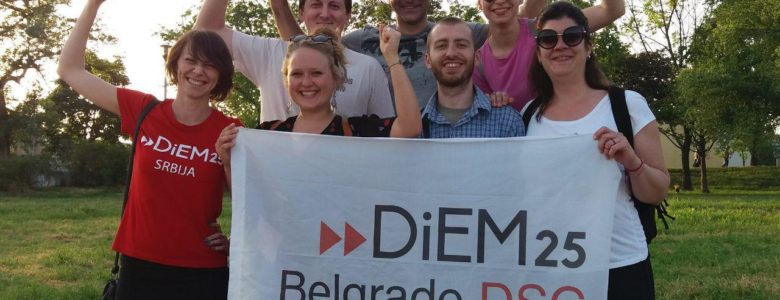
1st of May in Belgrade
On 1 May, we assembled in the streets in cities around the globe, remembering the struggles that have contributed so much to the well-being of workers and the humanity of our societies.
But while many groups claim to inherit this legacy, some betray it. Here in Belgrade, we decided not to join Trade Union protests, given their alignment with the crooked establishment interest.
Instead we gathered on the banks of the Sava River in Novi Beograd, the part of town that was constructed after WW II in Socialist Yugoslavia. For someone like me, from the Bavarian alpine region, Novi Beograd is a spectacle — and I wonder how people find their way home in this concrete conglomerate of symmetric lights and streets.
While we are floating on a raft on Sava River, Ivana told us that just a few hundred metres away, the ruling class, past and present, has been constructing houses in a river bed. Their decadence has contributed not only to the pollution of the river, but also points to a larger danger that the water level may rise due and flood through New Belgrade. Their decadence is our precarity.
But we have a better story to tell. We spent the day collectively formulating our vision for the Europe of tomorrow, discussing the ways that our thoughts and words will translate into action. We received pictures from our DiEM friends from all over the Europe, out on the streets, and they made us smile.
It was a great day for DiEM. We spent the day speaking face-to-face with each other, giving differences a common ground, returning to what has brought us together in the first place. A celebration, then, and one that ended – of course – with Rakija.
Elisa is a member and volunteer of the DSC Munich.
Want to stay up to date with DiEM25 Serbia? Follow their Facebook page and join their group.
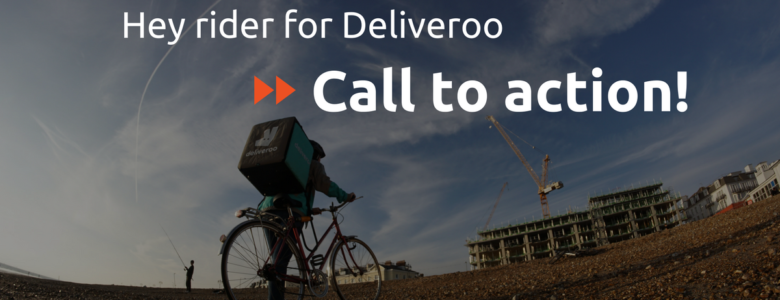
The Precariat is Pushing Back — We Must Support Them
Last week, in one of Amsterdam’s historic squares, Deliveroo drivers gathered to broadcast their message to the world. Their demands were not far-fetched, but fundamental: insurance, benefits, certainty and fair compensation.
But their movement is not only about Netherlands, nor only about the company Deliveroo.
It’s a world-wide problem. Applications and companies like Uber, Deliveroo and Airbnb have redefined labor rules and environment. They often treat their workers as independent contractors, make them use their own cars, bicycles and homes and fight hard to avoid employer responsibilities.
Even worse, they push to restrict workers’ rights, sometimes with governments’ support — even as they reap enormous profit but with minimal worker payout. It’s classic capitalism, then: on one side, workers with next-to-zero rights; and on the other, the accumulation of capital and power.
At DiEM25, we believe in workers’ rights. We fight against the unequal accumulation of wealth by platform executives, and against those who prefer to see workers as slaves, not humans. Our Progressive Agenda for Europe sets out our vision for a fair labour market where all can thrive. Join us here and contribute in shaping our common labor pillar!
Aris is a member and volunteer of the DiEM25 movement.

On the European Commission’s post-2020 long-term budget proposal
DiEM25’s EU Team is composed of a group of members working in and around the European institutions. They have gotten together to offer their inside knowledge of the EU in support of our movement. This is the first of many pieces they will contribute on EU affairs.
The EU long-term budget, the Multiannual Financial Framework (MFF), is a fundamental test for the EU’s political ambition and its ability to live up to the expectations of its citizens.
On May 2, the European Commission (EC) published its new 2021-2027 draft budget1.
The unambitious proposals presented by Commission President Jean-Claude Juncker and Budget Commissioner Günther Oettinger are short-sighted, unnecessarily populist, potentially dangerous and stand in clear contrast to the provisions of the European Treaties.
The proposals are short-sighted because they follow the same inflexible policies promoted by Centre-Right Governments (linear cuts, financialisation of policies, overly stringent conditionalities, etc). At a time of dramatic crisis for the European integration project, the European Commission should have re-launched and presented visionary and ambitious initiatives to fulfil its Treaty obligation to promote “the general interest of the Union”. Instead, Mr. Juncker proposed what amounts to mere “window dressing”: a limited budget increase, cuts to the Common Agricultural Policy and Cohesion Policy, crumbs for “new policies” (less than 10%).
The proposals are unnecessarily populist because the increased funding for Erasmus+ is still not enough and remains a fig leaf. Thus, it becomes a clumsy attempt to distract attention from the lack of vision and ambition of the budget proposal as a whole. In addition, €700 million of this increase for Erasmus+ will be spent on financing Interrail tickets for 18-year olds. While it is certainly a laudable aim to allow young people to explore Europe, this policy is deeply misguided and barely more than a poor PR stunt. To recover credibility and trust in the European project, projects like this one are woefully inadequate; especially if there is not enough money to finance programmes and policies to tackle larger challenges like youth unemployment.
The proposals are potentially dangerous because they seek to strengthen the technocratic and punitive direction of European governance. The draft also envisages the creation of a Defense fund and would shift more funding to security investments, marking a worrying trend towards a militarisation of the budget. In addition, the budget for “external border management, migration and asylum” would be tripled, raising concerns that “Fortress Europe” will be strengthened even further.2
What exactly does it mean when the Commission talks about strengthening the Eurozone and about a €25bn-programme to support reforms? In a political context governed by the Centre-Right, it means creating a straightjacket which prevents non-aligned Governments to adopt anti-austerity policies and have any budget flexibility.
The proposals stand in stark contrast to the provisions of the European Treaties, because they overturn the logic of some policies that are anchored in the Treaties in favour of Centre-Right Governments and austerity. The cuts to the Cohesion Policy are a blatant example of this: We should not forget that economic, social and territorial cohesion are enshrined in the Treaties as EU objectives.3
While the Cohesion Policy is often (rightly) accused of inefficiency, this cannot be a pretext for overturning the Union’s very purpose.
At its core, the Cohesion Policy was designed to reduce the development gap between regions and this remains a crucial necessity in the EU today.4 Unfortunately, when the treaties point to coordination of economic policies, the focus is always on territories, not on central Government choices and decisions taken under pressure in Brussels.5
A territory cannot pay the price of wrong economic policy choices decided in the capitals and in Brussels!
A territory cannot be held hostage by a Government under pressure from Brussels!
So, by enthusiastically proposing to cut cohesion funds and to strictly link the pay-out of structural funds to structural reform commitments, the Commission has betrayed its role and its function as guardian of the European Treaties.6 We must denounce it!
Cutting cohesion funds is like taxing public employees: easy and cynical!
For the European project to remain relevant to European citizens – and indeed, for it to survive – it needs sensible, long-term projects, and to imagine ambitious and courageous solutions. That’s why DiEM25 offers strong alternatives in its Green New Deal policy proposals that will lift Europe out of its multiple crises, and bring it boldly into the 21st century.
Over the next few months, DiEM25 will commit to building a strong European network of political partnerships to oppose the EC’s proposals, concretely and constructively.
We will do our part. Join us!
[1] European Commission proposals for the post-2020 MFF
[2] Press release
[3] TEU – TITLE I – COMMON PROVISIONS – Article 3 § 3: The Union shall establish an internal market. It shall work for the sustainable development of Europe based on balanced economic growth and price stability, a highly competitive social market economy, aiming at full employment and social progress, and a high level of protection and improvement of the quality of the environment. It shall promote scientific and technological advance. It shall combat social exclusion and discrimination, and shall promote social justice and protection, equality between women and men, solidarity between generations and protection of the rights of the child. It shall promote economic, social and territorial cohesion, and solidarity among Member States. It shall respect its rich cultural and linguistic diversity and shall ensure that Europe’s cultural heritage is safeguarded and enhanced.
[4] TFEU – TITLE XVIII – ECONOMIC, SOCIAL AND TERRITORIAL COHESION – Article 174 § 2 – In order to promote its overall harmonious development, the Union shall develop and pursue its actions leading to the strengthening of its economic, social and territorial cohesion. In particular, the Union shall aim at reducing disparities between the levels of development of the various regions and the backwardness of the least favoured regions. Among the regions concerned, particular attention shall be paid to rural areas, areas affected by industrial transition, and regions which suffer from severe and permanent natural or demographic handicaps such as the northernmost regions with very low population density and island, cross-border and mountain regions.
[5] TFEU – TITLE XVIII – ECONOMIC, SOCIAL AND TERRITORIAL COHESION – Article 175 – Member States shall conduct their economic policies and shall coordinate them in such a way as, in addition, to attain the objectives set out in Article 174. The formulation and implementation of the Union’s policies and actions and the implementation of the internal market shall take into account the objectives set out in Article 174 and shall contribute to their achievement. The Union shall also support the achievement of these objectives by the action it takes through the Structural Funds (European Agricultural Guidance and Guarantee Fund, Guidance Section; European Social Fund; European Regional Development Fund), the European Investment Bank and the other existing Financial Instruments.
[…] [6] TEU – TITLE III – PROVISIONS ON THE INSTITUTIONS – Article 17 – The Commission shall promote the general interest of the Union and take appropriate initiatives to that end. It shall ensure the application of the Treaties, and of measures adopted by the institutions pursuant to them. It shall oversee the application of Union law under the control of the Court of Justice of the European Union. It shall execute the budget and manage programmes. It shall exercise coordinating, executive and management functions, as laid down in the Treaties. With the exception of the common foreign and security policy, and other cases provided for in the Treaties, it shall ensure the Union’s external representation. It shall initiate the Union’s annual and multiannual programming with a view to achieving interinstitutional agreements.
[…] Structural reform commitments are required in the context of the European Semester.
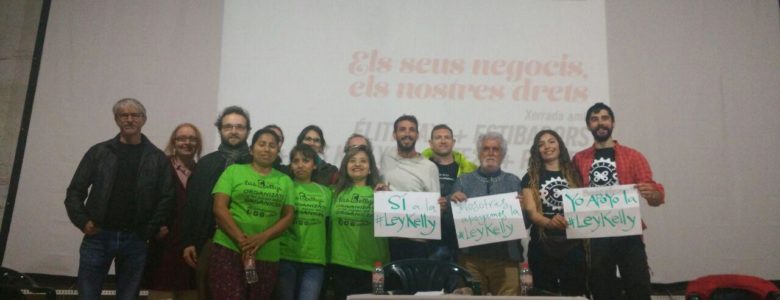
DSC Barcelona May 1st activities
We’ve been quite busy in Barcelona over the past few weeks:
On April 28 we hosted a concert from our fellow DiEMer from Berlin Nora Buschmann.
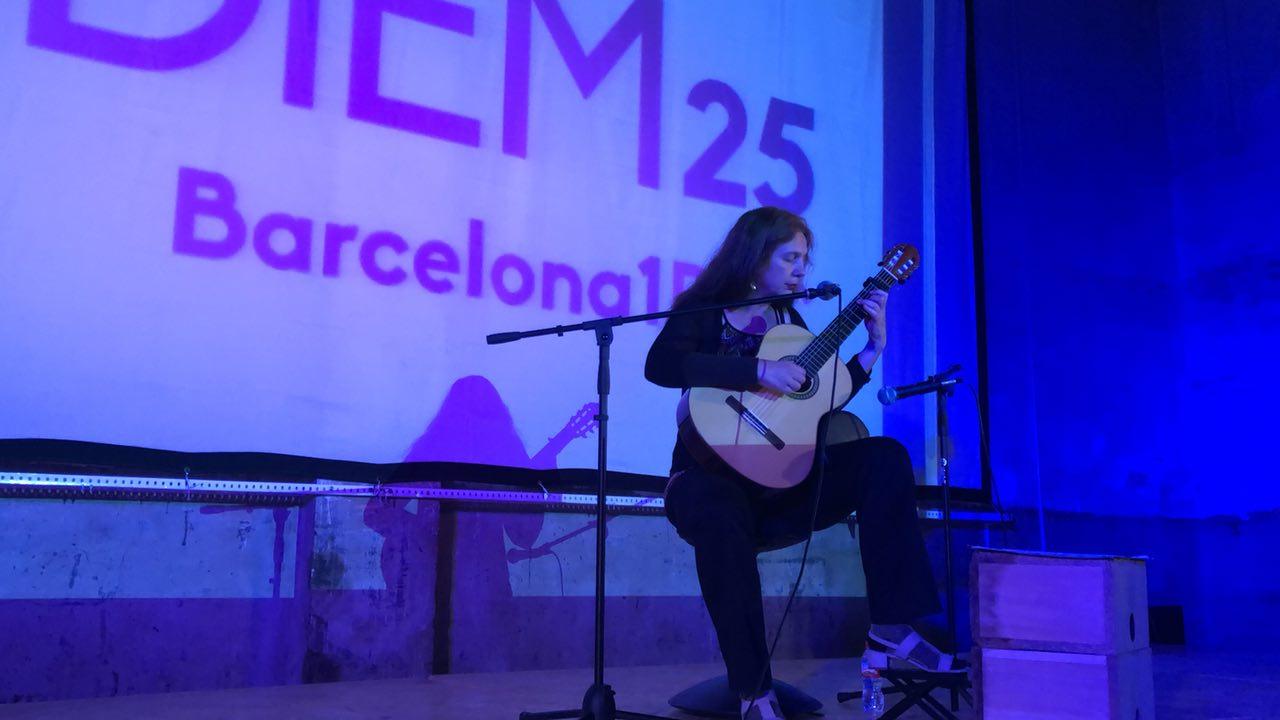
On April 29 we showed the French film ‘Merci, patron!’, which showed some of the effects the relocation of factories has had in France, in particular those from textile sector.
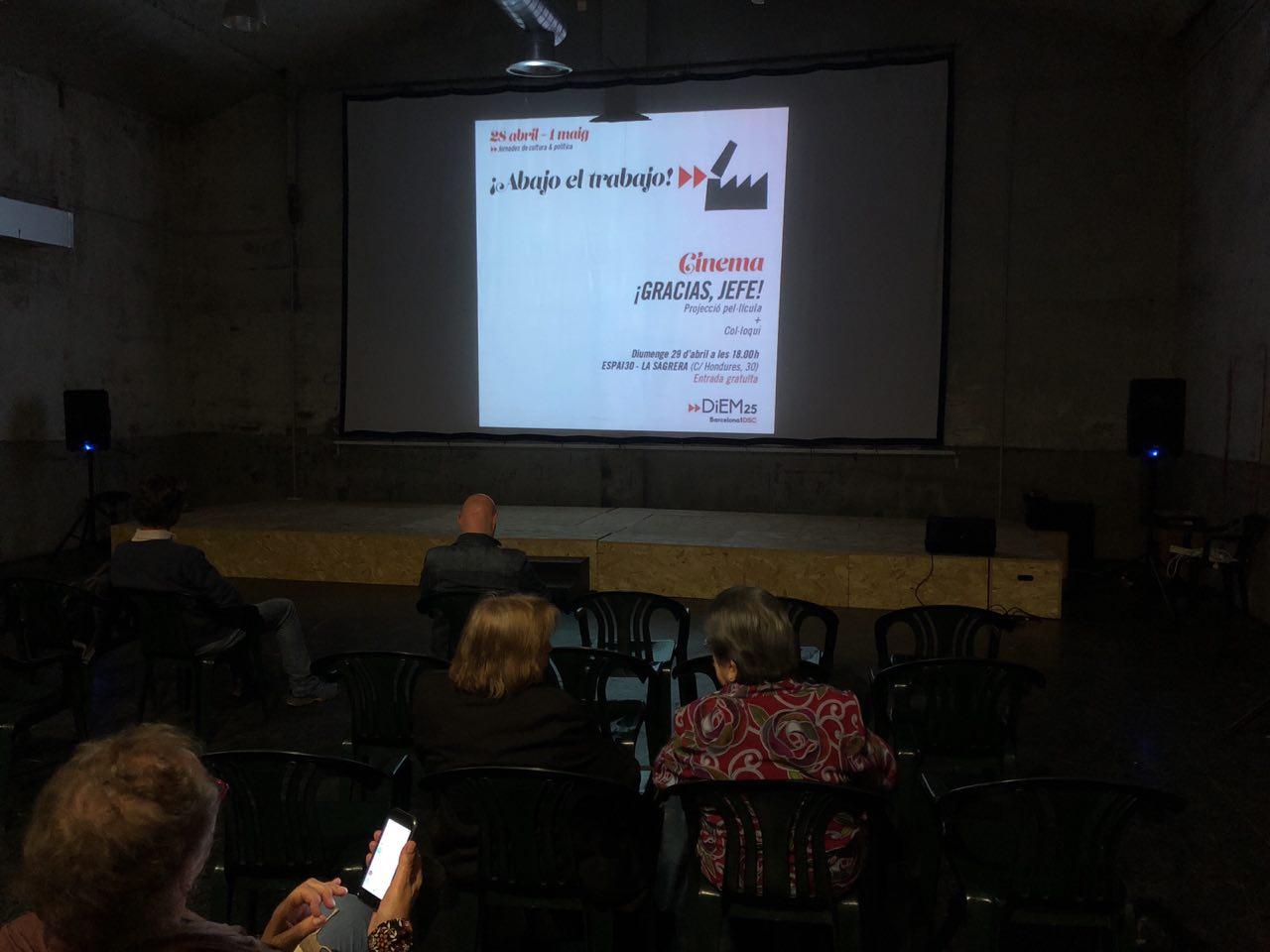
And on April 30 we had a very interesting chat with some local collectives about their struggle to recover labour rights for collectives such as the stevedores, delivery workers and chambermaids.
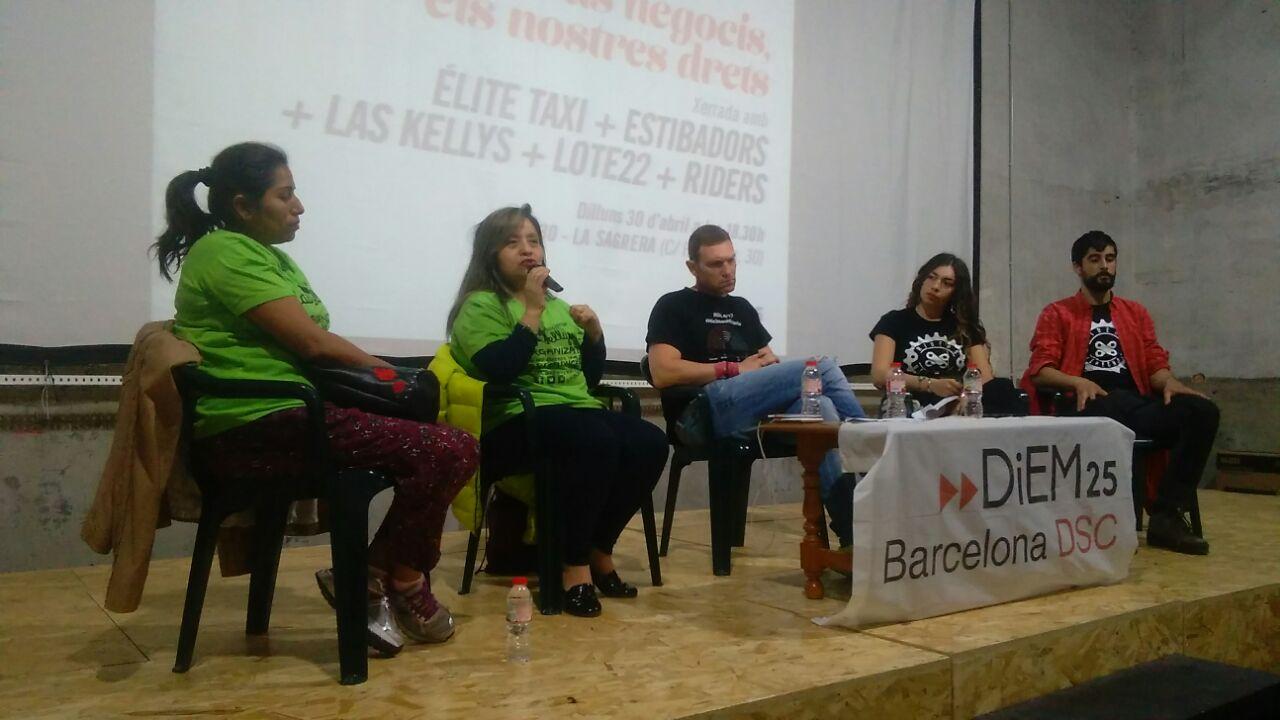
More soon!
Follow us on Twitter and Facebook
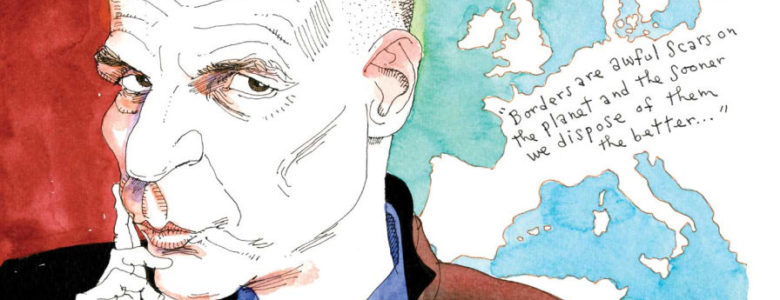
Saving the Sacred Cow
This article by Atossa Araxia Abrahamian was originally published in the May 28, 2018, edition of The Nation magazine and is republished with permission.
When Yanis Varoufakis, the former Greek finance minister who hopes to become the country’s next prime minister in 2019, first came to international prominence in the aftermath of the financial crisis, he was one of those left-wing politicians critical of Europe’s economic institutions, though not necessarily of the idea of Europe itself. Even as a young man, Varoufakis had always been struck by the idea of a united Europe as a way to “forge bonds relying not on kin, language, ethnicity, [or] a common enemy, but on common values and humanist principles.” His brief stint in the Syriza government never shook that conviction, but it did shape his ideas about how Europe should be reformed, and his trilogy of books about the financial crisis—The Global Minotaur; And the Weak Suffer What They Must?; and Adults in the Room—along with his latest book to be released in English, Talking to My Daughter About the Economy, all advance his vision of a more democratic international system.
The problem with Europe is that it is not a political union but a monetary one. Worse, key decisions about spending and lending are shaped by German and French technocrats, not by elected national representatives acting on their constituents’ wishes. Varoufakis’s reform proposals, put forward via his new pan-European movement, DiEM25 (“Day 25” in Latin), are wide-ranging and admirable. He hopes to see something like a United States of Europe emerge out of the EU’s existing structure—one in which Europeans share rights and responsibilities in both good times and bad, aided by the continent’s central banks, which would pool the profits from their various investments in a common depository in order to secure the economy in moments of crisis or scarcity. A share of every initial public offering undertaken in the EU would likewise go toward a universal dividend for all Europeans; citizens would be guaranteed a decent job in their home country, to prevent involuntary migration. By the same token, a common inheritance tax would apply, regardless of where people lived (or died).
“Saving the Sacred Cow” by Atossa Araxia Abrahamian was originally published in the May 28, 2018 edition of The Nation magazine and is republished with permission. Founded by abolitionists in 1865, The Nation has chronicled the breadth and depth of political and cultural life, from the debut of the telegraph to the rise of Twitter, serving as a critical, independent, and progressive voice in American journalism.
Illustration by Joe Ciardiello
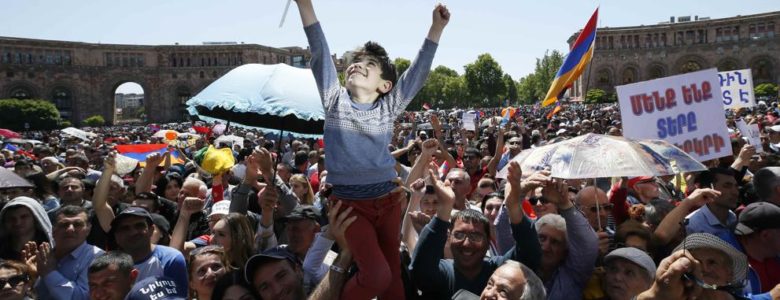
The Armenian Revolution succeeds!
After ten days of peaceful protests, mass marches and acts of civil disobedience, the people of Armenia have freed their country from the grip of tyranny.
The campaign began when the outgoing President Serj Sargsyan announced his intention to be appointed as Prime Minister, with almost unlimited powers and indefinite tenure. Several opposition members of parliament, who had spent time in jail as political prisoners, succeeded in garnering a swell of support across the country as the appointment day approached. Despite police brutality, mass arrests of protesters and periodic threats from the regime, the wave of protests snowballed after Sargsyan’s appointment went ahead, and demonstrators were soon joined by thousands of striking workers and students who left universities and schools to join the opposition movement. The climax came on Sunday when Sargsyan met the opposition leader Nikol Pashinyan and rejected the demand to resign without delay. The meeting lasted barely a few minutes and immediately afterwards a new wave of arrests took place, including that of Pashinyan himself. However, the rally that took place on Sunday night of April 22 in the central square of Yerevan was the largest yet, with conservative estimates putting the number of participants at over 150,000.
The morning of April 23 began with soldiers leaving their barracks to join the street protests, at which point Sargsyan realised the game was up and promptly resigned.
The Armenian Revolution has not only been about preventing a tyrant from staying in power indefinitely. It has also been about changing the political and economic model which suppressed economic freedom, enabled monopolies to flourish, undermined judicial impartiality, corrupted state officials, and imposed severe austerity on the poorest members of society. DiEM25 was among the first movements to provide coverage of the unfolding protests in Armenia, and its solidarity with the citizens of that country was invaluable.
This successful struggle proves once again that in the face of overwhelming people-power there is no alternative to genuine democracy, social justice and economic fairness, and that reactionary elites must yield eventually to grass-roots progressive forces fighting for justice.
Tigran is a member of DiEM25 living in Cyprus
Photo: (Gleb Garanich / Reuters)